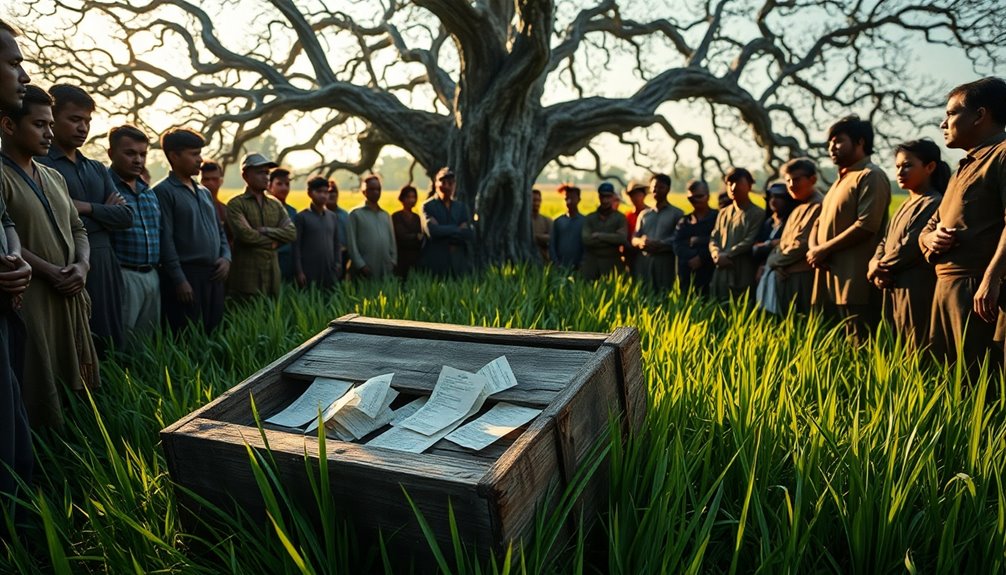In "The Lottery," symbolism reveals unsettling truths about tradition and community. The black box represents people's devotion to outdated customs, hinting at decay and danger. The stones show how easily normal objects can turn violent when tradition rules the day, highlighting society's chilling acceptance of brutality. The marked slip of paper illustrates random fate and how it can single someone out for punishment. Together, these symbols encourage you to think about how traditions can sometimes cloud our judgment, prompting deeper reflections on what's right and wrong in your own life. Discovering more about this story uncovers even greater lessons!
Key Takeaways
- The black box symbolizes the villagers' loyalty to outdated traditions and reflects the decay of understanding surrounding harmful rituals.
- Stones represent the chilling violence inherent in the lottery, illustrating collective brutality and societal desensitization to violence.
- The marked slip of paper signifies the random nature of fate and the stigma associated with violence, highlighting the shocking impact of tradition.
- The lottery itself embodies unexamined customs, showcasing the normalization of violence and the dangers of blind adherence to tradition.
- Overall, the symbolism in the story prompts reflection on the moral implications of societal norms and the necessity for critical examination of traditions.
Overview of The Lottery
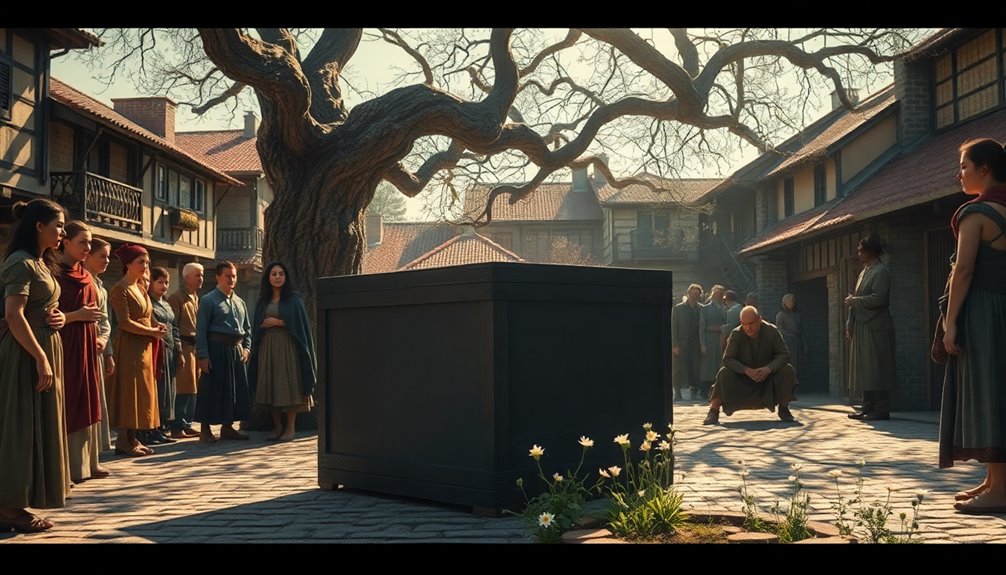
Have you ever considered how a seemingly innocent tradition can hide dark truths? "The Lottery," written by Shirley Jackson in 1948, dives into a small village's annual ritual that masks its sinister implications. The story centers around a lottery, where villagers gather to draw slips of paper from a worn black box. At first, it seems like a fun event, but as you read on, you discover the shocking reality behind it.
The tradition of the lottery reveals how people can blindly follow customs without questioning them. The villagers enjoy their neat lawns and pretty houses, but this peaceful setting hides something troubling. The black box represents the weight of their tradition—it's old and falling apart, yet no one wants to change how they do things. They cling to this ritual, even though it brings harm.
Symbolism throughout the story stresses the dangers of conformity. The lottery isn't just a game; it becomes a powerful reminder of how communities can overlook morality.
As you explore Jackson's tale, you'll see how traditions can sometimes mask dark truths, urging you to think about the customs in your own life.
The Significance of the Black Box

The black box in "The Lottery" stands as a powerful symbol of the villagers' unwavering loyalty to outdated traditions. This worn-out box holds the slips of paper used in the lottery drawing, showcasing the villagers' blind adherence to their customs.
Its shabby appearance tells a tale of decay, hinting at the villagers' reluctance to change. They cling to this box, even though it's falling apart, reflecting their attachment to practices that no longer make sense.
The black color of the box adds another layer of symbolism. It represents death and mourning, reminding everyone of the grim reality behind the lottery.
Each piece of the box comes from previous boxes, linking the past with the present. This connection shows how the villagers remember their violent tradition, but they never question its purpose.
Symbols of Violence: The Stones
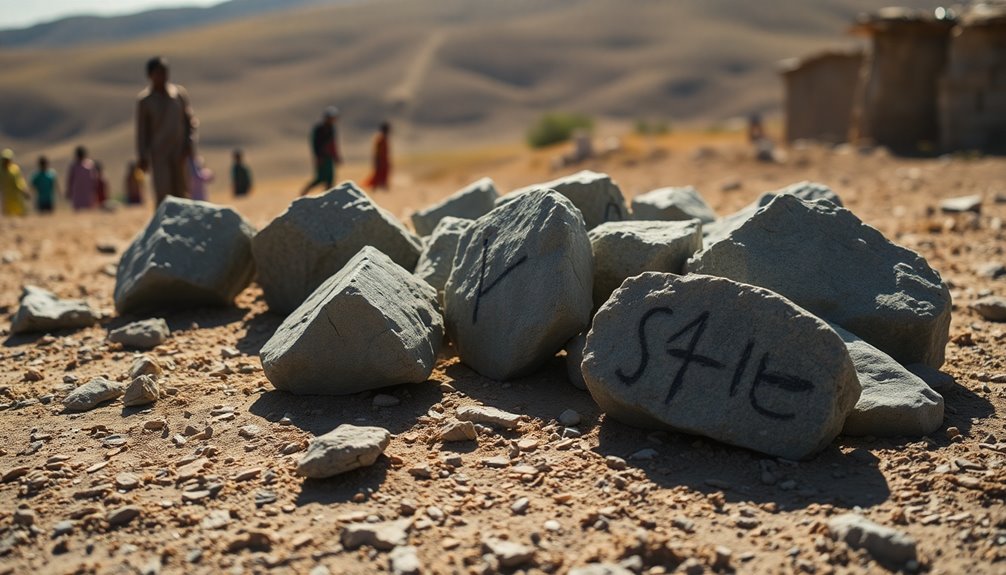
While the black box symbolizes the villagers' blind adherence to tradition, the stones represent the chilling violence that underpins their ritual. These stones serve as a constant reminder of the brutality hidden within the community. At first glance, they seem harmless, but during the lottery, they transform into deadly weapons. This shift highlights how easily people can accept violence when it's part of tradition.
Here's a closer look at the symbolism behind the stones:
| Symbol | Meaning | Impact on Society |
|---|---|---|
| Stones | Instruments of violence | Shows collective brutality |
| Stoning | Ritual execution | Reflects societal desensitization |
| Tradition | Blind following | Diminishes empathy and compassion |
| Community | Group conformity | Encourages participation in violence |
The act of stoning reveals a dark side of human nature. It shows how social pressure can strip away empathy, leading people to commit acts of violence. As you explore this theme, remember how the stones capture the harsh reality of traditions that can turn brutal.
The Marked Slip of Paper

The marked slip of paper is a key symbol in the lottery, showing how random selection can impact anyone in the community.
When you see that dark dot, it stands for stigma and isolation, reminding us that people can be unfairly labeled just by chance.
This little piece of paper sparks a big change, shifting the villagers from their everyday lives to a shocking act that highlights the randomness of violence.
Randomness of Selection
Often, people overlook the significance of the marked slip of paper in "The Lottery," yet it embodies the cruel randomness of the selection process. This small piece of paper, with its single dark dot, determines who'll face the village's violent traditions. It highlights how chance can decide someone's fate, making the randomness of selection feel even more chilling.
When you think about it, this marked slip of paper plays a big role in the villagers' collective actions. Everyone gathers, enthusiastic to find out who the "winner" is, but they don't realize the devastating implications behind it. The slip of paper becomes a powerful symbol of how societal norms can lead to shocking outcomes, all based on a simple draw.
As you read, you might feel the tension build. The slip shows the absurdity of this cruel ritual, reminding us how random choices can lead to suffering. It makes you wonder about the fairness of traditions that have no real reason behind them.
In this way, the marked slip of paper isn't just a piece of paper; it's a reflection of fate, chance, and the dark side of human nature.
Stigma and Isolation
One marked slip of paper can transform an individual into a target, illustrating the harsh reality of stigma and isolation in "The Lottery." When someone draws the slip with the dark dot, they're instantly set apart from the rest of the community, becoming a symbol of shame and vulnerability. This single slip of paper represents so much more than a random choice; it reveals the dark side of human behavior.
The marked paper turns a neighbor or friend into a scapegoat, highlighting how society can blindly follow traditions without questioning their morality. In an instant, the chosen person faces stigma and isolation, as everyone else pulls away, fearing association. The dark dot signifies that this person is now a target, stripped of their identity and worth.
As the villagers gather, the atmosphere shifts. The community's collective actions, driven by tradition, create a chilling sense of exclusion. No one wants to be the next victim. This scenario shows how easily individuals can be ostracized based on arbitrary criteria.
The marked slip of paper serves as a reminder of the absurdity of violence and the need to question the traditions we follow.
Tradition and Ritual in the Lottery
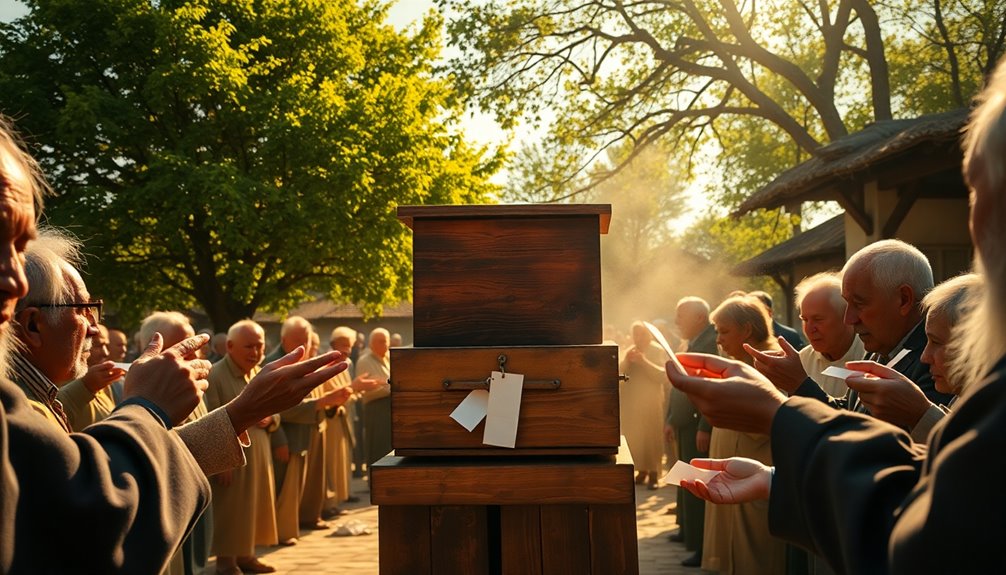
In "The Lottery," tradition plays a huge role in how the villagers behave. They follow the lottery without questioning it, showing how customs can sometimes lead people to make choices that aren't right.
This ritual creates a sense of community, but it also highlights the fear and pressure that can come from sticking to traditions that may not make sense anymore.
Blind Adherence to Customs
The villagers blindly uphold their customs each year during the lottery, participating in a ritual that's become an unquestioned part of their lives. They don't stop to think about why they do it. This blind adherence to customs shows how powerful traditions can be, even when they don't make sense anymore. The saying, "Lottery in June, corn be heavy soon," makes them believe the lottery helps their crops, but it's just a tradition without real meaning.
The villagers use a shabby black box for the lottery, which symbolizes the decay of their old customs. It's falling apart, just like their understanding of why they keep the ritual alive.
When they gather to stone the chosen person, it becomes a normal act, hiding the horror behind a veil of community participation. This acceptance of violence reveals how easily people can follow along without questioning what's right or wrong.
In this way, the symbolism in the lottery serves as a reminder. It shows the dangers of sticking to traditions without examining their purpose.
The villagers' behavior illustrates how social pressure can shape actions, leading to chilling consequences that no one dares to challenge.
Rituals and Community Dynamics
Customs shape the identity of the village, creating a sense of belonging that overshadows the brutality of the lottery ritual. These rituals are performed year after year, binding the community together through tradition. You might feel the excitement as everyone gathers, but underneath that joy lies a chilling reality. The lottery becomes a shared experience, where social pressure and fear of being left out push people to participate without questioning the morality of the act.
While the villagers seem united, the true community dynamics reveal a darker side. Many simply follow the crowd, succumbing to mob mentality. This means that individual voices and feelings get lost in the excitement of the group. It's a powerful reminder that sometimes, what feels like belonging can lead to harmful choices.
The story encourages you to think about the importance of questioning traditions. Are they really worth keeping if they lead to inhumane outcomes? By reflecting on these rituals, you can understand how easily people might overlook kindness and empathy in the name of tradition.
Community Dynamics and Conformity
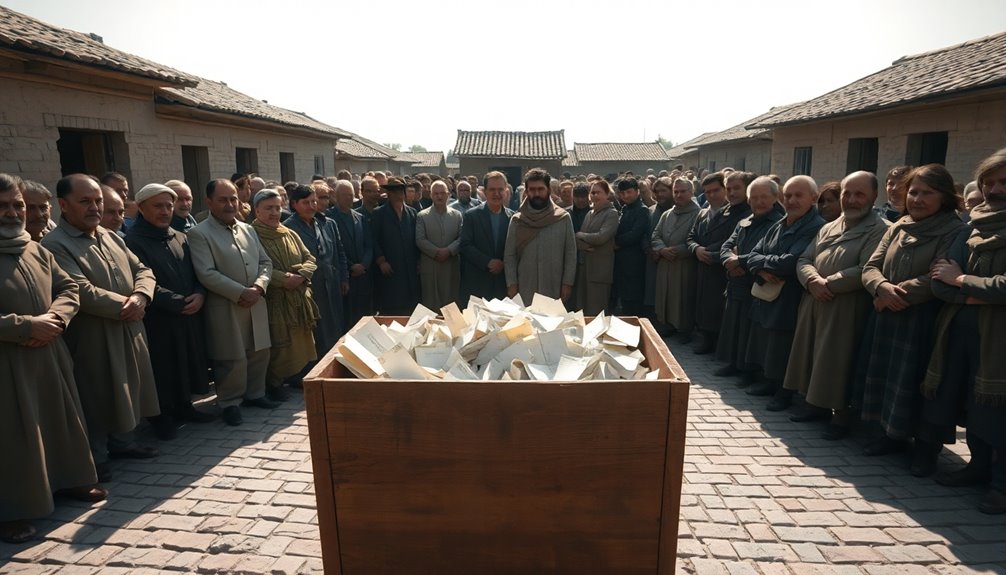
Community dynamics in "The Lottery" reveal how conformity shapes individual behavior and societal norms. In this village, everyone seems to follow the same rules, even if they know those rules can be cruel. You can see how social pressure makes people act in ways they wouldn't on their own. Fear of being left out or ostracized encourages villagers to accept the lottery, no matter how brutal it is.
When the lottery begins, the collective behavior of the crowd takes over. People join in, almost like they're part of a big team, forgetting their personal beliefs. This mob mentality shows how group dynamics can lead to decisions that seem shocking when you think about them alone. The ritual acts like a chain that keeps everyone connected, but it also keeps them from speaking out against it.
In "The Lottery," you can really feel the weight of conformity. It teaches us that blindly following traditions can make us lose our individuality.
Understanding these community dynamics helps us see the importance of standing up for what's right, even when everyone else seems to be going along with the crowd.
Reflection on Tradition and Morality
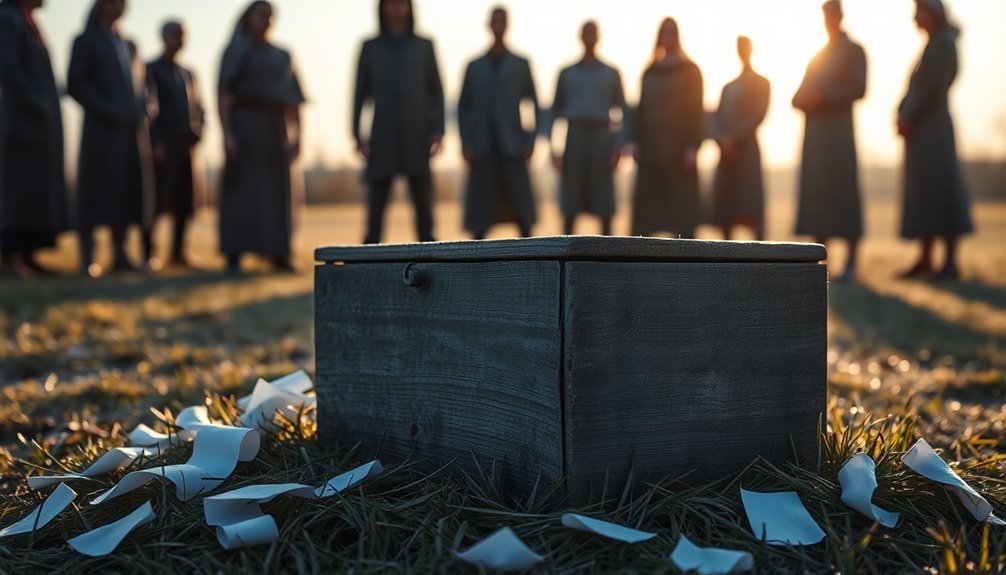
Questioning tradition is essential if we want to avoid the moral pitfalls seen in "The Lottery." This story serves as a stark reminder that blindly following inherited customs can lead to horrific outcomes, such as the villagers' participation in a ritualistic murder without any critical thought. When you reflect on tradition, it opens your eyes to the morality behind these practices.
Imagine living in a community where violence becomes normal because no one dares to question why they do what they do. In "The Lottery," the villagers accept their tradition without thinking about its true meaning. This acceptance leads to a tragic ending and shows how dangerous unexamined customs can be.
As new generations come along, it's crucial they challenge outdated practices. By doing this, you can help prevent the continuation of harmful behaviors.
Reflecting on tradition isn't just about keeping the past alive; it's about ensuring that what you believe in aligns with kindness and justice.
Frequently Asked Questions
What Are 3 Symbols in the Lottery?
In "The Lottery," three important symbols stand out.
First, the black box represents tradition, even as it falls apart.
Then, the slips of paper show how random fate can be, with one slip deciding someone's future.
Finally, stones symbolize the villagers' acceptance of violence, used in a shocking ritual.
Each symbol highlights how people can follow customs without questioning them, making us think about the impact of tradition in our own lives!
How Does Jackson Use Symbolism in the Lottery?
Shirley Jackson uses symbolism in "The Lottery" to reveal important themes about tradition and human nature.
You'll notice the black box, which represents how people follow customs blindly, even when they're harmful.
Then, there are the stones, showing the violence inside us all.
Finally, the marked slip of paper highlights how fate can be random.
These symbols create a powerful story that makes you think about the choices we all make.
Which of the Following Is an Example of Symbolism in the Lottery?
One example of symbolism in "The Lottery" is the black box. It represents the villagers' loyalty to old traditions, even when they're outdated. The box looks worn and shabby, showing how those customs have lost their meaning over time.
Another example is the marked slip of paper, which symbolizes the randomness of fate. It shows how anyone can be chosen for something terrible without any reason.
These symbols really deepen the story's themes!
What Is the Symbolism of the Paper in the Lottery?
The paper in the lottery is like a ticket to a terrifying game, where fate takes a dark turn. Each slip represents chance, showing how randomly someone can be chosen for something awful.
The black dot on the paper stands out, marking its holder for a grim fate. This symbolizes how society can unfairly target individuals, highlighting the shocking reality of violence hidden beneath a tradition that seems innocent at first glance.
Conclusion
In the end, "The Lottery" teaches us important lessons about tradition and the choices we make. The black box, stones, and marked paper remind us that sometimes, we must question community customs. By understanding these symbols, we can spark conversations about our own beliefs and values. Let's stay curious and courageous, always ready to challenge what we think we understand. After all, it's our responsibility to build a brighter, better future for everyone!

